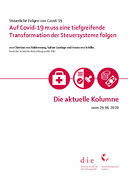
Auf Covid-19 muss eine tiefgreifende Transformation der Steuersysteme folgen
von Haldenwang, Christian / Sabine Laudage / Armin von Schiller (2020)
Die aktuelle Kolumne, 29. Juni 2020
Steuersysteme können eine Schlüsselrolle dabei spielen, um die sozialen und wirtschaftlichen Folgen der Covid-19-Pandemie in Entwicklungsländern abzufedern und nach der Pandemie eine möglichst rasche und nachhaltige wirtschaftliche Erholung zu befördern.